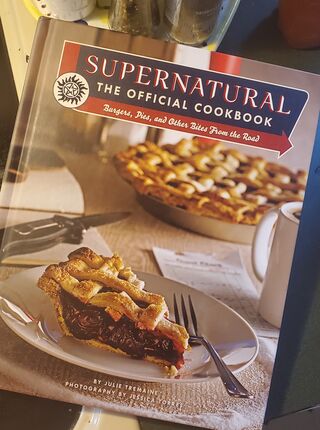Stress
How Fans Have Found New Ways to De-Stress
The pandemic has changed the way fans connect with what they love.
Posted February 2, 2022 Reviewed by Ekua Hagan
Key points
- Seven out of 10 adults report feeling tired and frustrated as the pandemic continues. Connecting with things one loves can help.
- The pandemic has put a significant strain on people's limited mental resources, leading to information overload.
- Fans have found new ways to connect with the things they love that won’t exhaust their resources, from cookbooks to music playlists to ASMR.
The Kaiser Family Foundation this week released the results of its latest comprehensive poll on the impact of COVID-19, finding that 7 in 10 adults, across demographic categories of age, gender, ethnicity, and income, report feeling tired and frustrated. That probably comes as a surprise to no one, unless you’re wondering who those other three people are who are not tired and frustrated about the pandemic.
Our favorite things—film, television, bands, books, baseball teams—have been a refuge and an escape from the stress of the pandemic. But the pandemic has also changed the way fans interact with the things they love and prompted many to try out some enjoyable alternatives.
From Communal to Individual: Fandom in the Pandemic
Like many things, the way people consume media has changed due to the pandemic. One of the most therapeutic things about fandom is its communal nature—fans gather with other fans to celebrate what they love, and experience a sense of validation and belongingness as a result. COVID restrictions changed those communal celebrations to more individual ones. Watching the new Spiderman movie in your living room alone or with a few other people is not quite the exhilarating experience of being one of hundreds in a movie theater, screaming at the scary parts or cheering together at the heroic parts. Similarly, sporting events happened without any in-person audience, so fans had to watch from home instead. Yelling at the television screen in your living room does not bring the same catharsis or sense of being part of the team that being in the stands cheering or booing with thousands of other fans does. Fan conventions and concerts also pivoted to virtual.
The lack of communal experience was particularly difficult since the pandemic has left many people feeling lonely and isolated. Humans are nothing if not resourceful, however. The changes expanded the ways in which people connect with their favorite media, and these have persisted even as the more communal forms of fan interaction slowly resume.
The Impact of Information Overload
The increasing popularity of other types of media content was also impacted by another change. Even before the pandemic, some researchers suggested that our attention spans are decreasing as a result of using technology to consume media and information. Studies are inconsistent as to whether that’s actually happening, or whether attention just varies with mood, environment, and other variables. But even if people are still capable of watching a three-hour movie, they may not want to right now. Many people report having difficulty concentrating or focusing since the start of the pandemic, in part because COVID-19 is not only a pandemic but an "infodemic."
We have a limited amount of neurological resources to process everything in our environments, so we use selective attention to parcel it out where needed. The pandemic put a significant strain on our mental resources—after a long day of scrolling through sometimes conflicting medical information and advice, individuals can experience cognitive overload. This information overload has been found to create psychological discomfort in a study of young people and social media during the pandemic, leaving some with a need to "unplug" while also battling FOMO, the fear of missing out (Liu, et al., 2021).
The pandemic has increased stress levels in other ways as well, such as by making the world unpredictable, leaving people in a chronic state of anxiety. This constant state of alertness and uncertainty has created "pandemic fatigue," a chronic sense of emotional exhaustion that does not leave a lot of room for concentrating on a three-hour movie.
We naturally try to conserve our limited resources of energy and attention, looking for things that don’t deplete us cognitively or ways to distract ourselves instead of focusing intensely on something. So instead of sitting through a three-hour movie, some fans have found other ways to connect with the things they love.
5 Ways to Celebrate Fandom That Won’t Exhaust Cognitive Resources
Streaming and Short Form Content. Pandemic fatigue and information overload contribute to the increasing popularity of shorter-form content. Being able to binge-watch television and movies has changed the way we consume media; you can stop a streaming film to take a break, for example. Content that is intentionally created for delivery in briefer increments has also exploded. The popularity of short-form storytelling is evident in YouTube and TikTok videos and other user-generated content.

Fandom Comfort Food. Fans of many different types of media and sports have also taken comfort food to the next level during the pandemic with another traditional creative pursuit—cooking. There are fandom-related cookbooks of all kinds, from Supernatural to the NFL to Harry Potter, which has over 50 cookbooks listed on Amazon right now. Cooking has had increased appeal during the pandemic, and connecting it to a beloved fandom makes it even better.
Get Crafty. Another benefit of fandom is its encouragement of creativity, but motivation for things like writing fanfiction may be harder to access with overloaded cognitive resources. However, there are alternative means of creative expression, including painting or drawing. Fans have also rediscovered traditional pursuits such as knitting and embroidery. There are how-to videos on YouTube and plenty of examples on Etsy if you’re looking for some inspiration in your particular fandom.

Close Your Eyes and Listen. Music is also a great way for fans to connect with what they love, engage the imagination, and de-stress. If you’re a fan of a singer or band, the connection is obvious, but there are playlists on music streaming platforms and YouTube for many television shows and films too. If you have the cognitive resources, make your own and share it with other fans. Fandom-related podcasts also exist for almost anything you might fall in love with. Find a podcast that fits your tastes and talks about your favorite things, then kick back and just listen.
Join Your Favorite Characters in ASMR. Fans have also discovered ASMR (Autonomous Sensory Meridian Response) videos intended to create an enjoyable tingling sensation from watching and listening to scenarios with gentle and often repetitive sounds. Fans can find these hypnotically relaxing aural environments on platforms like YouTube, where you can spend a half-hour in the backseat of the Winchesters' '67 Impala if you’re a Supernatural fan, lulled by the rumble of the engine and Sam and Dean’s quiet, everyday conversation in the front. Though the research on ASMR is in its infancy, positive comments and the large followings of ASMR creators suggest that many people find ASMR videos a good way to relax and de-stress.
You might want to try one of these ways of enjoying whatever you’re a fan of the next time you’re faced with information overload and pandemic fatigue at the end of the day.
References
Hamel, L., Lopes, L., Sparks, G., Kirzinger, A., Kearney, Al, Stokes, M. & Brodie, M. (2022). KFF Covid-19 Vaccine Monitor: January 2022




